
Recently on Cyclingnews.com |
An interview with Bjarne Riis, March 11, 2009
Bjarne Riis: Bearing the burden of truth
Bjarne Riis' 1996 Tour de France victory brought a rush of uncomfortable attention to an otherwise private man. Cyclingnews' Kirsten Robbins spoke with Riis about how his struggle with the spotlight affected his public portrait and his personal life, and cast doubt on his credibility.
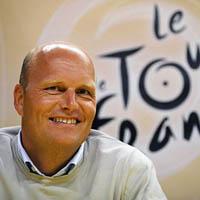
|
At his height of fame, Bjarne Riis was hailed as Denmark's sports figure of the century. At his lowest, he was reviled as a confessed doper who cheated to achieve his greatest victory. Now, he is regarded as one of the strongest team managers in the sport and he leads his riders with a fatherly mix of discipline and encouragement.
Riis credits his career successes to two influential men in his life: his father, Preben, who passed away less than a year ago, and his mentor, Laurent Fignon.
Riis' father recognised his son's undeniable talent for cycling at an early age, and the two developed a close bond through the sport. "My father followed me everywhere I went," says Riis, who now resides in Lugano, Switzerland, with his partner Anne-Dorthe and five children - Jesper (19), Thomas (16), Christian (six), Mattias (five) and Andreas (three). None are cyclists... yet.
"He was a big part of my life, especially when I was a kid. I don't know how he knew about training, but he did," explains Riis. "He pushed me, no doubt about it. But I liked to be pushed. There's a lot of talk about dads pushing their kids to be better, too early, because of their own ego. I don't care about that, I liked it."
After Bjarne won nearly every race on the local calendar, he earned the nickname 'Ørnen fra Herning' (the eagle from Herning), a nickname that stuck with him as he rose through the professional ranks.
His father's undivided attention and lessons in work ethic helped Riis evolve into a world-class competitor, and his support of his son was unfailing to the end. "He was my trainer and I had a lot of support from him," Riis says. "He was by best friend."
His father's death came shortly after Riis confessed to doping during his professional career in May, 2007. The Amaury Sport Organisation (ASO) had Riis briefly removed from the list of Tour winners, and he offered up his maillots jaune in response to reporters' questions, saying they were meaningless.
While the ASO made no demands to return the prestigious yellow jerseys, his father wasn't about to give them up if they did, and hid them as keepsakes of his life-long dedication to professional cycling.
"I never liked the magazines, shows and parties that are around for celebrities. I never took part. But I can't run away from the attention..."-Riis talks about fame following his 1996 Tour de France win. |
"I didn't give back anything," Riis said. "You can take away jerseys. You can take away medals. But you can't take away the memories."
The second prominent figure who helped mould Riis was Laurent Fignon, his mentor on the French team Systeme U, who taught the Dane the leadership skills he implemented during his own 1996 Tour victory.
Riis met Fignon in 1988 after two unsatisfactory years with his first professional outfit, Toshiba. His big break in cycling came later that year when the Dane helped helped the esteemed Frenchman win the Tour of European Community, albeit while riding for separate teams.
In December of that year, Systeme U offered Riis the contract opportunity of a lifetime. He quickly became Fignon's dedicated support rider and the pair developed a close friendship.
"I learned many things from him but mainly how to be a leader - taking responsibility - it is what gave me strength at the Tour later on," says Riis.
Working for Fignon developed Riis into more than just a strong domestique. Results started pouring in for the Dane, who began frequently taking top 10 placings in events such as the Giro d'Italia while helping Fignon win the maglia rosa in 1989. In less than five years, Riis had been transformed into one of the world's leading GC contenders, finishing third in the 1995 Tour de France before going on to win la grande boucle the following year.
His life changed with that famous victory riding for Team Telekom, but not necessarily for the better.
Unwanted fame
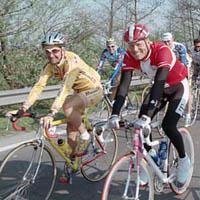
|
When Riis broke Miguel Indurain's five-year Tour de France winning streak in 1996, he quickly became the most famous person in Denmark and this shy, reserved man was suddenly thrust into the spotlight.
"My life changed a lot, no doubt about that," Riis says about the relentless attention from the Danish press. "I am not the kind of person to seek fame, I'm a very shy guy and not one who likes to be in the limelight, not even today."
Fame had trickled into his life during his years as Fignon's right hand man and during his years of leading teams Gewiss-Ballan and Telekom. This hadn't prepared him for the world-wide attention of a Tour winner, however.
"I was not really famous in my first years as a pro," Riis says, adding, "I was young and Denmark is a small country, so certainly everyone was watching the Tour. I was riding for Fignon so that was something very special for me.
"It all started slow at first. I won awards in Denmark, then I was third in 1995 and even bigger because I was on the podium. After I actually won - it exploded."
Riis is still one of the most discussed characters in the Danish press, and his Tour de France victory did for Denmark what Lance Armstrong's Tour de France victories have done for the USA. It brought massive world-wide attention to Danish cycling, but also into his personal life.
"I think all the Tour winners are different." says Riis, who, unlike Armstrong, was never able to portray his true personality through the press, and was criticised for being too serious and unsociable.
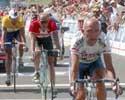
|
"Indurain is a very humble guy, very quiet and he lives his own quiet life without getting too much involved in things. Lance has a very different way and is always involved in the media. I think everyone needs to do what is best for them and others should respect that. Maybe that's why I've been misunderstood."
A rider who wins the Tour, Amstel Gold Race and stages of the Giro d'Italia cannot avoid the press, but it was never something Riis was comfortable with.
"I never liked the magazines, shows and parties that are around for celebrities. I never took part. But, I can't run away from the attention. I'm Bjarne Riis and I won the Tour de France so I'm famous, for good and for bad - I am."
The pressure came to a head leading up to the 1997 Tour de France and it took its toll on Riis' marriage with his first wife Metta. Few people knew that before the race had begun, Riis and Metta had filed for divorce.
As the defending champion, Riis was expected to arrive in top condition and all eyes were watching and waiting for him to bring Denmark a second victory, but it did not happen. While was his young teammate Jan Ullrich was riding away to the overall victory, Riis faced obstacle after obstacle, culminating in his famous bike toss during the final time trial.
Building a wall of protection
In the turbulent year that followed Riis' Tour victory, the press repainted his image from that of a likable hero into someone with a closed and unhappy disposition. Without adequate instruction on part of his team on how to deal with fame, Riis had no control over how he was perceived.
"My life changed a lot and all of a sudden everyone wanted a part of me," Riis explains. "At that time I did not have a lot of energy to give to people, to the press. I came as the defending Tour winner with my family problems. There was so much pressure on me, especially from the Danish press. I just couldn't handle it."
There were no public relations staff in the '90s and as a result Riis dealt with much of the media by shutting them out. "You can only imagine that there were parts of the press that had nothing to do with cycling, knew nothing about cycling and I was alone and had to deal with that," he continues.
"I've gone through a development in cycling from 1998 until now regarding doping and anti-doping... Of course I won the Tour in the '90s so I was involved in all that."-Riis explains the rationale behind his confession in May 2007.. |
"I was never told how to act with the press. I was stressed because all I wanted was to focus on the Tour. I cut a lot of people off. I was the Tour winner so anything that I did was a good story."
After switching from rider to team manager of Teams CSC - now Saxo Bank - Riis' interactions with the media have changed somewhat. He still appears quite serious, but attributes this to a deep sense of responsibility he feels as the team owner.
"When I'm working I am serious and it's necessary for me to be strict, and that is when most of the press see me," says Riis, who admits he has a much more humorous side outside of work.
"To be honest, a lot of people don't know me. The press shows me in one way and I don't always see myself as they make me out to be. Maybe it was my own fault. I really don't see it and I believe my friends and family don't see me like that either... at least that's what they tell me!"
Lightening the load
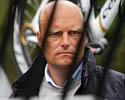
|
An accurate description of Riis' character might be one of strong authority and influence. Within the last three years, he has used his powerful position as owner and manager of team CSC, now Saxo Bank, to help create one of the worlds most prominent anti-doping programs. It was built in conjunction with Dr. Rasmus Damsgaard and partnered with the International Cycling Union (UCI).
Helping to implement a strong anti-doping program for cycling came after Riis lightened his conscience about his personal history with performance-enhancing drug use throughout his own career.
After the Festina scandal of 1998 uncovered EPO use, rumours abounded about Riis' methods during his Tour win. He vehemently denied allegations of drug use that ran through the peloton. But, his reputed nickname became 'Mr. 60 percent', a reference to his rumored high haematocrit levels.
In 2007, after years of denial, he decided to clear his conscious and come clean. On May 25 that year, Riis issued a statement confessing that he had used banned substances EPO, Human Growth Hormone and Cortisone during the years of 1993-1998, including the year he won the Tour de France.
His confession came after a string of doping confessions from prominent cyclists and former Telekom teammates. His admission caused the Danish government to denounce Riis, who was once seen as a national hero.
"I've gone through a development in cycling from 1998 until now regarding doping and anti-doping," says Riis. "Of course I won the Tour in the '90s so I was involved in all that. No matter what, that has been following me for more than 10 years. I don't need to explain; I believe you can imagine how it feels now to be a part of that period. My country was so small so I really had to protect myself.
"I think there has been a lot of protection going on since 1998 up until two years ago when I stepped forward and made my confession," Riis continues. "Not just the Danish press but from all areas. Today, everything is a lot easier for me. I still have to deal with it but I have people and staff to help me now. I was protecting myself for what I did and I know that it's something that you can't change overnight."
According to Riis he did not confess because other cyclists and former teammates were stepping forward. Rather it felt like the right moment to make amends for previous lies during his career.
"There were a lot of things going on and I wanted peace to be honest but I didn't get it," says Riis, who knew his team (then-CSC) Saxo Bank was strong enough to withstand the ramifications. "At least I was honest to myself so I'm still glad I did it. I feel a lot lighter and I have a good feeling about it. I disappointed many people and I'm sorry for that."
There were mixed opinions surrounding his confession. Some felt that his actions were disgraceful and his former results worthless. Others felt that his voluntary confession was courageous and worthy of keeping his Tour de France title.
"People want you to be honest and then when you're honest, they kill you," Riis explains. "For me the easiest thing would've been to run away. I could've lived my life quietly with my family. But I had a responsibility in cycling and something to stand up for. I think I'm an honest person. I've made mistakes and I've admitted them. I try to do the best I can and if it's not good enough for everybody else, fine."
Making a change
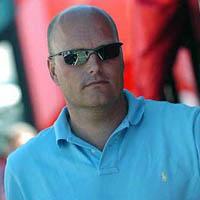
|
After years of carrying the heavy burden of his doping past, Riis emerged with a novel concept to prove to the world that he was running his team clean. He commissioned the creation of an internal anti-doping program, partnered with Dr. Rasmus Damsgaard and Dr. Bo Belhage, the chief of medicine at the Bispebjerg Hospital in Copenhagen, Denmark, in 2006.
Damsgaard created the first regime of blood profiling for Team CSC, and his model later became the basis of the UCI's biological passport program. It was an important step for Riis to pay the sport back after his transgressions.
"We have proven that we can win the Tour de France without doping, it's about doing the right thing," Riis says regarding former team rider Carlos Sastre's 2008 Tour de France victory.
"When I made my confession, I did what was right for me personally. But, I also have an influence on the future of this sport and this is what I do with my job. I'm still here because I want to do things for myself. I want to do things to help the sport of cycling and for my team."
Riis employed Damsgaard because his anti-doping programme was the most innovative of its kind. Damsgaard was brought on board with Team CSC to coordinate additional testing, and analyse and publish the team's internal doping tests. The program was seen as unique in a sport heavily criticised for drug use. However, Damsgaard came under criticism from Belhage, who felt the program lacked transparency, and the hospital ended its partnership.
While Damsgaard continues to examine the data from the team's test results given to him from the UCI's passport system, the split brought more criticism for Riis and speculation from a cynical public - speculation fueled by Riis' past dishonesty. But he strongly defends the integrity of his program.
"If we didn't show that we really try to change the sport than I will say shoot at us," Riis said. "But before criticising me and my team, I would very much appreciate that people do some research. Go in and actually find out what our anti-doping programme is about, how it was actually done to improve cycling and what is behind it.
"It's is so easy just to shoot it down. Talking about fairness, I'm in a position where I can see what is fair and not. But I don't think it is fair to shoot at us without analysing what we are doing. We all have to live with the history of our sport, but it is history."
In part two of the interview, Riis talks about how his own history shaped the way he runs his team.
Photography
For a thumbnail gallery of these images, click here
Images by Sirotti/www.sirotti.it
- Riis finishes between Marco Pantani and Miguel Indurain in Mende on stage 12 of the 1995 Tour de France.
- Riis (c) rides with Pantani and Mario Cipollini during the 1997 Milan-Sanremo.
- Riis at the 2007 Vuelta a Espaņa having confessed to EPO use earlier that year.
Images by Roberto Bettini/www.bettiniphoto.net
- Riis in a pensive mood... something he is often criticised for, although says it's the result of responsibility.
- Riis has a chequered past with Le Tour having won it as a rider, been scrubbed from the history books and won it as a manager last year.
